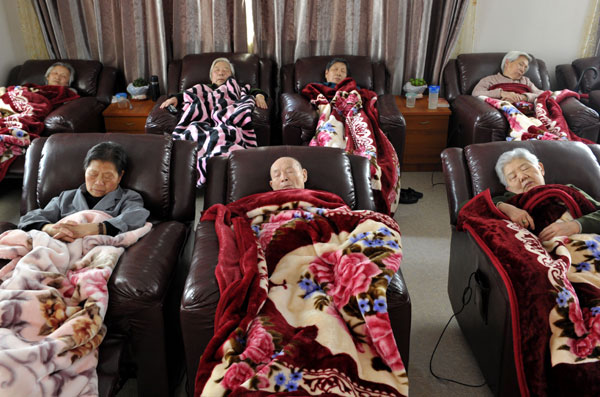Majority of Shanghai elderly open to house-for-pension plan
|
 Senior citizens sleep at a daytime service center in Shanghai in April. The city has 3.67 million people aged 60 or older, accounting for 25.7 percent of its registered population. Niu Yixin / for China Daily |
More than 70 percent of elderly people in Shanghai are open to a house-for-pension program, a survey showed, despite a recent public outcry against the idea raised in a central government document.
According to the Shanghai investigation team under the National Bureau of Statistics, the program was supported by 73 percent of respondents as a possible means to ease the burden on elderly people in an aging society where people are choosing to have fewer or no children.
Under the program, an elderly person who owns a property could deed the house to an insurance company or bank, which would determine the value of the property and the applicant's life expectancy, and pay out a fixed amount of money every month.
The survey of 2,248 residents aged from 60 to 79 who have lived in Shanghai for more than one year found only 27 percent of respondents were firmly against the idea, the bureau's investigation team said in a report.
Those against the program cited various reasons including the possibility of family disputes, and that they don't need the program because their children will care for them in their old age.
Respondents in rural areas said the program is impossible because the land used for building rural houses cannot be traded.
Earlier this month, the State Council, China's cabinet, issued a document promising a complete social care network for people over the age of 60 by 2020.
The house-for-pension program, together with other policies such as encouraging private investment in elder care services, is dedicated to serving the world's largest population of elderly.
But the proposal drew wide criticism, with many suggesting that it shows the government is preparing to pay less attention to elder care services.
Experts said those respondents who said yes to the idea would not necessarily utilize the program.
"Intuitively, it is impossible to have such a high rate of people accepting the idea," said Feng Jin, a professor at Fudan University's Economics School.
"If you casually ask them, they may say yes to the program. But when they are requested to make the decision to mortgage their houses for a pension, it will be a different thing," she added.
In the United States, where a similar program has been in place for more than 20 years, only 2 percent of people aged 65 or above have mortgaged their houses for a pension, according to Feng.
In Hong Kong, only 11 percent of property owners accepted the idea, based on a survey in 2000 of 1,867 Hong Kong residents aged between 49 and 59.
A pilot program to test the idea by China Citic Bank in Shanghai proved unsuccessful because it did not comply with market demand, Feng added.
Yang Lei, founder of Huoban Jujia Homecare Service, said some elderly people showed interest in the program when she raised it.
All were childless or had children who had settled overseas, she said. "They accept the idea because they don't have a person to inherit their property," she added.
It is reasonable therefore that some oppose the idea in order to leave their house to their children, she said.
Wang Xiuzhen, 64, a retired worker, said a clear no to the proposal. "We are not Westerners. Asian culture promotes that you need to leave some heritage for your children."
The Shanghai survey also found 87.5 percent of respondents agreed with the concept of "raising sons to help in old age", and 67.3 percent supported the traditional concept of the family supporting its elderly members.
The respondents expected the authorities to provide more beds at care centers, improve community-based caring services and enhance the service level of those engaged in the sector, the survey found.
By the end of 2012, Shanghai had 3.67 million people aged 60 or older, accounting for 25.7 percent of its total registered population, according to Shanghai Civil Affairs Bureau. Shanghai also has millions of migrants who are not registered in the city.??


















